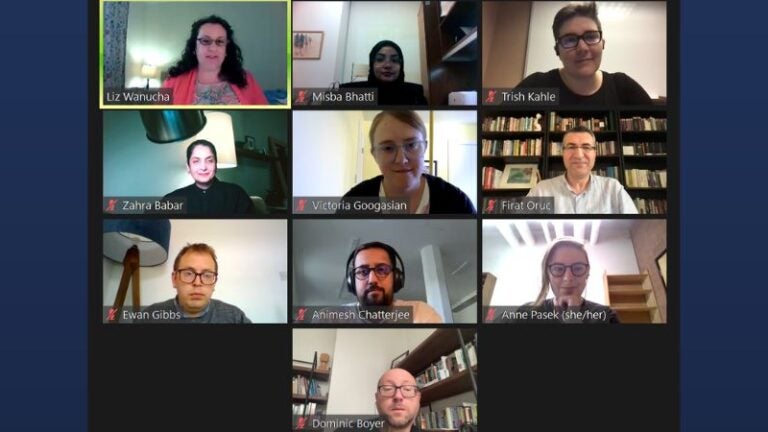American Studies, Regional Studies
Affects of Energy Transition Working Group I

On May 24, 2022, the Center for International and Regional Studies at Georgetown University Qatar convened the first working group under its Energy and Affect Theory research project. The working group, led by GU-Q faculty members Trish Kahle, Firat Oruc, and Victoria Googasian, was held virtually and brought together multidisciplinary scholars to discuss their paper abstracts for written contributions that are being developed as a journal special issue. The participants engaged in focused discussions on cross-cutting themes of affect, energy transition, and labor that will inform all of the papers in the collection.
Animesh Chatterjee proposed a study of everyday experiences of energy in colonial Calcutta’s domestic spheres, around 1875 – 1940s. His paper contribution builds on a larger book project which describes the social life of electricity in colonial Calcutta. He proposes to examine how class and social identities shaped the ways in which people interacted with and made meanings of different forms of energy, especially electricity. His study focuses on the gendering of energy consumption in the domestic sphere, as well as the politics of energy use in the context of colonialism and Bengali nationalism.
Ewan Gibbs’ paper assesses lives in energy industries, focused on workers’ experiences in Britain’s coal and offshore oil and gas sector, as well as in nuclear and conventional power generation. Using oral histories that were structured around telling life stories, he examines how workers’ experiences incorporate reflections on local and national experiences of energy transitions. By concentrating on transition as a workplace and community experience, Gibbs studies how workers made sense of movements from one source of energy to the other and how they implicated themselves within larger processes of economic change. Through a contrast between experiences in the UK’s major energy sectors, this article also contributes to understanding of distinctions between labor regimes as well as the commonalities that underlay conceptions of what it meant to be British energy workers.
Anne Pasek’s contribution looks at how people see and sensorialize carbon. Pasek argues that while carbon is dominant in everyday life and industrial processes, it is not always visible. Her paper will look at the sensorial politics of carbon in carbon removal and sequestration, examining how the process is tied up in energy transitions more broadly. Pasek also seeks to examine the experiences of carbon removal workers and their emotional and affective stakes for the work they do. Her aim is to map their affective involvement in their work on behalf of the climate system. Pasek proposes to study these processes by bringing together the labor theory of value with affect theory.
Victoria Googasian will contribute a paper that explores a sub-genre of science fiction, the space opera. These literary works imagine human life centuries into the future and involve interplanetary and interstellar travel. Googasian explained that while space operas texts narrate human futures that depend on vast reserves of energy, they rarely explore questions of where the energy is to come from or what kinds of energy transitions may underwrite their worldbuilding. Instead, they maintain a fantasy of endless imperial expansion and human power over material environments. However, throughout the history of the genre, space opera also imagines characters who are materially embedded in their energy systems and characterized by embodied vulnerability. Taking these characters as a starting point, Googasian aims to study whether this seemingly reactionary genre might have an alternative energy imaginary that is grounded in humility, finitude, and limits of energetic life.
In order to generate new possibilities and identify connections between their scholarship, the group was divided into several smaller break-out sessions where participants were invited to deliberate on particular themes and concepts. In the first break-out session, the four paper contributors were asked to think through and highlight questions of time and space in relation to affect in their own work. For the second breakout session, the participants explored the theme of labor in regards to identity/subjectivity and values/structures. The last session focused specifically on transition and questions on modes of perception and narrative and obscurity. Finally, the participants reconvened as a complete group to share some of the main questions and takeaways from the break-out sessions and discuss how these will be developed and addressed in the final drafts of the paper contributions.
The second working group for the project will be held in September 2022, in which participants will discuss and get feedback on their draft papers.
- To view the working group agenda, click here
- To read the participants’ biographies, click here
- Read more about this research initiative
Participants and Discussants:
- Zahra Babar, CIRS – Georgetown University in Qatar
- Misba Bhatti, CIRS – Georgetown University in Qatar
- Dominic Boyer, Rice University
- Animesh Chatterjee, Technische Universität Darmstadt
- Ewan Gibbs, University of Glasgow
- Vicky Googasian, Georgetown University in Qatar
- Trish Kahle, Georgetown University in Qatar
- Firat Oruc, Georgetown University in Qatar
- Anne Pasek, Trent University
- Elizabeth Wanucha, CIRS – Georgetown University Qatar
Article by Misba Bhatti, Research Analyst at CIRS